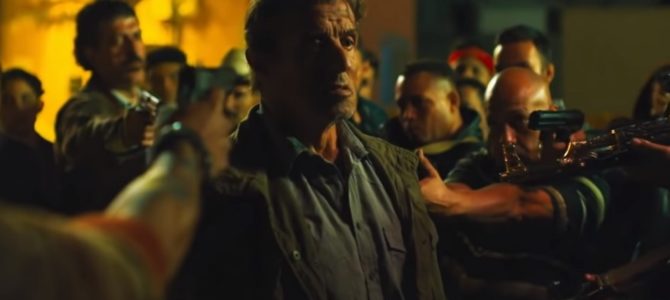
Minor plot spoilers below.
Sylvester Stallone has brought Rambo back for one last movie—although we cannot be sure he really means “Rambo: Last Blood” is the end of his second most famous franchise until we see the box office returns. This is his Donald Trump movie, all about the need to defend the border from the terrifying criminals who rule over fearful citizens in Mexico.
Stallone has long been the most pro-Republican film-maker in Hollywood, not accidentally the most successful man in the most pro-Republican genre: action. His movies in the 1980s praised Ronald Reagan and the hope he inspired. “Rambo: First Blood Part II” (1985) relitigated Vietnam with the famous phrase “Do we get to win this time?” Then “Rambo III” (1988), set in Afghanistan, dramatized American help to the Mujahedeen fighting the Soviets.
Most famously, Stallone wrote, directed, and starred in “Rocky IV” (1985), Hollywood’s only iconic Cold War movie. He had a writing credit on all the Rambo movies, but also directed the fourth in the franchise, “Rambo” (2008), a movie for the War on Terror. It is a pro-Bush movie, where heroism means saving Christian missionaries and defeating a tyrannical military junta oppressing innocent people.
Now we get to the Trump era. John Rambo is on his father’s farm in Arizona. He’s old, trying to live down his past and leave something good behind by playing step-father to a young Hispanic girl, Gabriella, whose mother died and father abandoned them. The girl is coming of age, but instead of going to college, she desperately wants to find her father and ask why he left.
This sense of orphanhood in search of an identity leads her to cross the border into Mexico, where human traffickers enslave and drug her for a prostitute. That’s how we get back to the drama typical of the Rambo movies. America is heart-breaking for some, so there are always people in need of protection, like Rambo is in need of redemption. Rambo is America’s last patriot, agonizing over what’s going wrong with the country.
This is why the violence in the movie is defensive, unlike the War on Terror thriller “Sicario” (2015), where FBI and CIA agents go into Mexico. Here the fight is in Arizona. This is about defending America, reminding Americans of their vulnerability to crime and of their power to enforce the border. Even the R-rated gore of the movie corresponds to Trump’s rhetoric. It’s certainly ugly, but is it wrong?
The prestigious taste in our times is for criminals instead of heroes, hence the success of series like Netflix’s “Narcos,” about the most famous Colombian drug lord, Pablo Escobar, and “Narcos: Mexico.” People would once have been ashamed to pay so much attention to evil men. Now, the liberal audience can condemn capitalism and enterprising men while still worshiping success, so long as it is illegal. This sophisticated attitude is not vulnerable to accusations of undermining patriotism.
Compared to that bid for prestige that marries glamorous movie-making, stories aimed to inspire thinkpieces in prestigious magazines, and an attempt at immersion into another culture, “Rambo: Last Blood” is explicitly and emphatically simple and vulgar. Rambo says we shouldn’t look for the reasons bad men do bad things, only to avoid or stop them. Cruelty is presented in all its squalor and cynicism, without any heroic allure.
I don’t know if audiences will be attracted to Stallone’s storytelling in an age when every entertainment executive is looking for the next “Game Of Thrones,” where concern for justice seems to be primarily a set-up in an elaborate joke, and corruption is presented as a luxury. But he does well to present the ugliness of vengeance and its necessary connection to justice, for without punishment for atrocities, how could citizenship endure?
Stallone has no compassion for drug cartels, only for their victims: terrified girls, abducted, drugged, reduced to slavery in a modern state, and treated like animals. This is what gives the story its moral force, of indignation requiring violence. This is therefore nowhere near as dialogue-driven a story as most nowadays. We will find out whether audiences still like the strong, silent type.
The strength of the movie is its absence of psychologizing, the wise refusal to explain the pathologies and the cause of those pathologies in terrifying criminals. Justice cannot be seriously pursued when storytelling is all about psychotherapy. The weakness of the movie is related to that strength—a lack of characterization. Strangely, the elements required for it are all there, just underused.
Rambo has built underground tunnels where he does blacksmith work, making knives and various other steel tools and weapons. He tames horses and trains them for reining. This is supposed to point out his great effort to control his anger and to put it to work instead of letting it drive him mad. But here the elements of filming you’d expect to make up for the lack of words—cinematography, music, editing—are all missing.
If Stallone lucked into playing a cowboy, the American man par excellence in stories, he should have learned from the classics: John Wayne needed John Ford’s great cinematic art, which makes “Stagecoach” and “The Searchers” beautiful movies. The beauty engages us in the drama and reveals the importance of what’s happening to the protagonist and why he is resolved to do the right thing. For justice to be put on screen, it has to show its nobility. Here, the film falters.
Rambo has always been a very difficult character to write, because he is too close to tragedy for our taste. Compare him with the lovable oaf Rocky, an everyman rather than a super-soldier, a Boy Scout rather than an angel of death bringing vengeance. This latest and perhaps last outing lacks the American grandeur of the ‘80s, but doesn’t really have anything to replace it. In his twilight, Rambo somehow lacks dignity. You want to still admire him, but it’s harder now.









